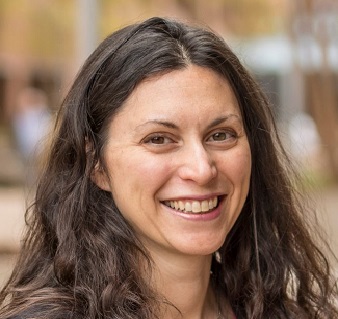Vanderbilt Kennedy Center (TN UCEDD, LEND, IDDRC) Member Receives $2.3 Million NIH Director's New Innovator Award
December 5, 2018

|
Reyna Gordon, Ph.D., assistant professor of Otolaryngology and a Vanderbilt Kennedy Center (TN UCEDD, LEND, IDDRC) member, has received a National Institutes of Health (NIH) Director's New Innovator Award of $2.3 million in total costs for her project, "Biomarkers of Rhythmic Communication: Integrating Foundational and Translational Approaches."
The New Innovator Award, established in 2007, supports unusually innovative research from early career investigators who are within 10 years of their final degree or clinical residency and have not yet received a research project grant or equivalent NIH grant. Gordon's grant is among 58 New Innovator Awards made this year as a part of the NIH's High-Risk, High-Reward Research program, given to exceptionally creative scientists proposing to use highly innovative approaches to tackle major challenges in biomedical research.
The overall program funded 89 grants across four categories for 2018.
"This program supports exceptionally innovative researchers who have the potential to transform the biomedical field," said NIH director Francis S. Collins, M.D., Ph.D. "I am confident this new cohort will revolutionize our approaches to biomedical research through their groundbreaking work."
Gordon, the lead author of a 2014 study that found an intriguing connection between rhythm and grammar in children, explained that there are two major components in her New Innovator project. The first will seek to identify health phenotypes that might share a biological basis with humans' musical rhythm abilities, through data available in BioVU, Vanderbilt's bank of de-identified DNA samples, as well as collaborations with colleagues at the Vanderbilt Genetics Institute.
"It has been such a pleasure to work with Reyna on developing the plans for this research. Speech seems like such a quintessential human trait, and yet must have arisen through adaptations of earlier brain architecture for communication," said Institute director Nancy Cox, Ph.D., Mary Phillips Edmonds Gray Professor of Genetics and Gordon's mentor. "Reyna's insight to pull rhythm and music into speech research and to link these investigations through genetics is outstanding. I cannot wait to see what she learns over the next few years."
In the second component, Gordon's interdisciplinary research team will integrate biomarkers of rhythm at the genetic, neural, and behavioral levels to better understand individual differences in rhythm as a risk factor for developing childhood speech and language disorders.
"I am honored and thrilled to be a New Innovator recipient, as this particular project really speaks to my professional mission to work across disciplinary boundaries to enhance our understanding of how and why musicality is related to brain development and human health," Gordon said. "I look forward to the collaborative opportunities afforded by the grant, with particular emphases on novel work we will conduct with the Vanderbilt Genetics Institute and the new research training experiences that the project will create for neuroscience students working with my lab through our affiliation with the Vanderbilt Brain Institute."
The Music Cognition Lab, part of the Program for Music, Mind and Society at Vanderbilt, was formed just three years ago with funding provided by the Department of Otolaryngology. Additional institutional investment that supported pilot work on the genetics of music and language traits included a Trans-Institutional Program (TIPs) grant from Vanderbilt University as well as funds from the Vanderbilt Kennedy Center and the Curb Center for Art, Enterprise and Public Policy.
Ron Eavey, M.D., Guy M. Maness Professor and chair of Otolaryngology and director of the Vanderbilt Bill Wilkerson Center, said music is a special tool to create communication and open a window into emotional behavior influence.
"Reyna - in a very short time - has created both a lab and a network of colleagues focused on the science of music, which is so vital for humankind," he said. "We are thrilled that she was awarded with the prestigious NIH Director's New Innovator Award to conduct new collaborative analyses aimed at understanding the genetics of musical traits. She has significant support for her mission, and we look forward to learning from her discoveries."
Eavey credited the NIH for its support of music as a topic worthy of scientific attention, the early TIPs award, the unique music ecosystem in Music City as well as the faculty and staff of the Bill Wilkerson Center and the Department of Otolaryngology.
The NIH grant number for Gordon's award is DP2 HD098859.







